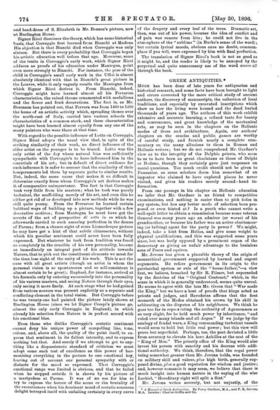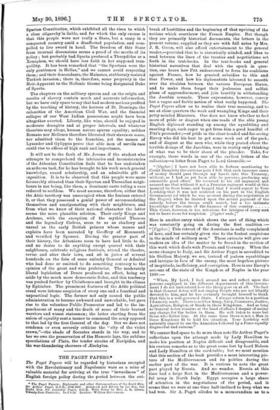GREEK ANTIQUITIES. • Mum has been done of late years
for antiquarian and historical research, and some facts have been brought to light and errors corrected by the more critical study of ancient authors, the discovery of manuscripts, the collection of local traditions, and especially by excavated inscriptions which show us how the living were housed and the dead buried thousands of years ago. The authors of this work exhibit extensive and accurate learning, a refined taste for beauty and convenience, and great knowledge of the mechanical arts, as may be seen in the chapters on the Hellenic modes of dress and architecture. Again, our authors' chapters on the oracles and public games are worthy of careful study, and furnish nearly a complete com- mentary on the many allusions to them in Roman and Hellenic writers ; but we do not comprehend Mr. Gardner'e view as to the integrity of the Delphic priests, who seem to us to have been as great charlatans as those of Delphi or Dodona, though they certainly gave just responses on moral questions. Too much credit should not be given to Pausanias, as some scholars deem him somewhat of an impostor who claimed to have explored places he never visited, and gives his readers merely second - hand in- formation.
From one passage in his chapter on Hellenic education we infer that Mr. Gardner is no friend to competitive examinations, and nothing is easier than to pick holes in any system, but has any better mode of selection been pro- posed or even hinted at ? Is a youth who cannot write a well-spelt letter to obtain a commission because some veteran General was many years ago an admirer (or worse) of his grandmother, or because his father was an active electioneer ing (or bribing) agent for the party in power We might, indeed, take a hint from Hellas, and give some weight to physical qualifications, and this was suggested some years since, but was hotly opposed by a prominent organ of the democracy as giving an unfair advantage to the brainless sons of Peers and squires.
Mr. Jevons has given a plausible theory of the origin of monarchical government supported by learned and cogent arguments. He refers government in its origin to the patriarchal system or rule of the " house-father,"—a view first, we believe, broached by Sir R. Filmer, but superseded by the doctrine of the "Original Contract," which, in the sense in which it is generally understood, seems quite unreal. He seems to agree with the late Mr. Green that "War made the King," but we have a host of proofs that kings acted as priests and judges, and Herodotus affirms that the first monarch of the Medea obtained his crown by his skill in arbitrating on the disputes of his neighbours. We think he goes too far in reprcsmting the authority of Agamemnon as so very slight, for he held much power by inheritance, "and ruled over many islands and all Argos." If we judge by the analogy of feudal wars, a King commanding turbulent vassals would seem to hold but little real power ; but this view will prove but superficial. Perhaps, too, the poet deviated a little from accuracy to elevate his hero Achilles at the cost of the "King of Men." The priestly office of the King would also invest his person with sanctity and his decrees with addi- tional authority. We think, therefore, that the regal power being somewhat greater than Mr. Jevons holds, was founded on military skill and valour, plus high birth, generally sup- posed divine, p/us a good reputation for wiedom and justice ; and, however romantic it may seem, we believe that there is much insight into human nature in the saying of the wise Lochiel, "Hereditary right will split a flint."
Mr. Jevons writes severely, but not unjustly, of the
• A. Manual of Greek Antiquities. By Percy Gardner. M.A., and F. B. Jevons. DI.A. London : Charles Griffin and 0o. Spartan Constitution, which exhibited all the vines to which a close oligarchy4s liable, and for which the only excuse is that this people were not really a State, but a camp in a conquered country amid a disaffected population, and com- pelled to live sword in hand. The freedom of this State from internal dissensions seems a proof of the merits of its policy ; but probably had Sparta produced a Thucydides or a Xenophon, we should have less faith in her supposed tran- quillity. It has been remarked that "the Spartans were the only gentlemen in Hellas," and we cannot avoid respecting them ; and their descendants, the Mainotes, stubbornly resisted Turkish invasion ; there is, therefore, some propriety in the Heir-Apparent to the Hellenic throne being designated Duke of Sparta.
The chapters on the military system and on the origin and results of slavery contain much and accurate information, but we have only space to say that had modern nations profited by the teaching of history, the horrors of St. Domingo, the calamities of the American Civil War, and the financial collapse of our West Indian possessions might have been altogether averted. Liberty, like wine, should be enjoyed in moderate draughts and at proper intervals, and whatever theorists may allege, human nature spurns equality; neither Romans nor Hellenes therefore liberated their slaves en mane, nor admitted them to the franchise, yet the names of Lysander and Gylippus prove that able men of servile race could rise to offices of high rank and importance.
It will not be the fault of Mr. Jevons if the student who attempts to comprehend the intricacies and inconsistencies of the Athenian Constitution finds that he has undertaken an arduous task, for he has brought to his work much general knowledge, sound scholarship, and an admirable gift of exposition. It is to be observed that this people were more favourably situated than their Spartan and Thessalian neigh- bours in not being, like them, a dominant caste ruling a race reduced to serfdom. We must assume, therefore, either that the Attic territory was unoccupied when the Ionians entered it, or that they possessed a genial power of accommodating themselves and amalgamating with their neighbours, and from what we know of their national character the latter seems the more plausible solution. Their early Kings and Archons, with the exception of the mythical Theseus and the legendary Codrus, seem to us as shadowy and unreal as the early British princes whose names and exploits have been narrated by Geoffrey of Monmouth and versified by Spenser. During the greater part of their history, the Athenians seem to have had little to do, and no desire to do anything except quarrel with their neighbours, celebrate religious festivals, attend the theatre, revise and alter their laws, and sit in juries of several hundreds on the fate of some unlucky General or Admiral who had done or omitted to do something contrary to the opinion of the great and wise proletariat. The moderately liberal legislation of Draco produced no effect, being set aside by the much more democratic Solon, and this tendency was pushed further by Cleisthenes and brought to its climax by Ephialtes. The prominent features of the Attic political creed were intense suspicion of every one and a fanatical and unpractical logic. The former not only caused the public administration to become awkward and unworkable, but gave rise to the volunteer Public Prosecutor and led to the im- peachment of many and the death of some of their bravest warriors and wisest statesmen ; the latter starting from the axiom of equality sent a tanner to command the army opposed to that led by the first General of the day. But we dare not condemn or even severely criticise the "city of the violet crown,"—the shade of Socrates stands in the way, and to her we owe the preservation of the Homeric lays, the sublime speculations of Plato, the tender strains of Euripides, and the war-thundering choruses of .,Eschylus.



































 Previous page
Previous page